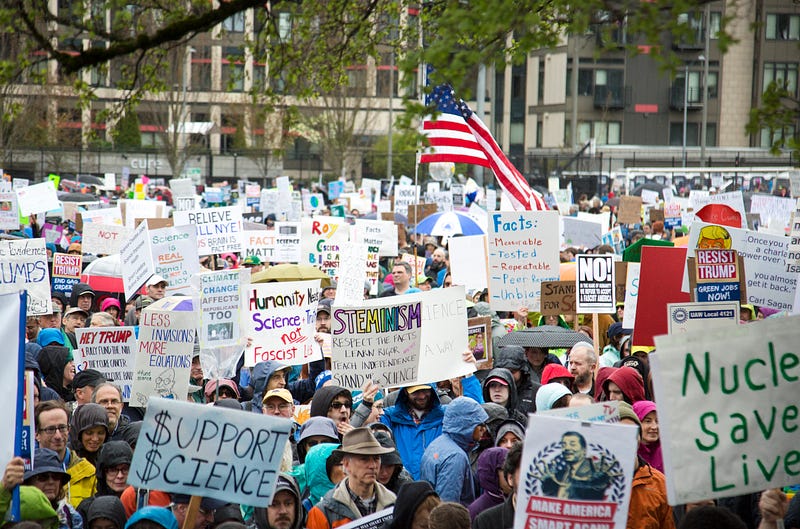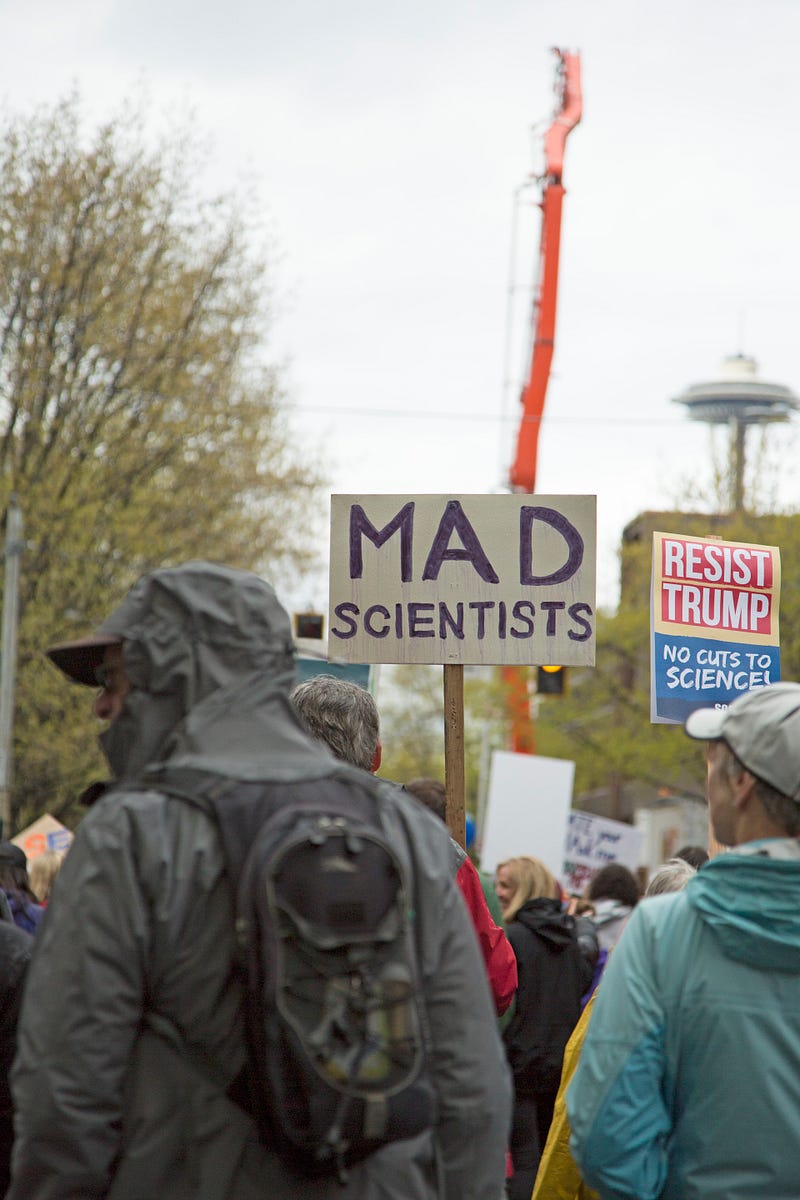Political Science
A chemist works to transform politics by getting scientists to run for office
Story and photos by Jesse Nichols

Andrew Zwicker is a plasma physicist. He’s worked at the Princeton Plasma Physics Lab for nearly two decades. When he started, he studied fusion energy, hoping to one day use it to power the planet. Year after year, he would see his lab’s federal funding rise and fall. It wasn’t any different under Democratic or Republican leadership. Zwicker was frustrated with the way politicians were handling scientific issues, from research funds to climate change. He wanted to see more evidence-based thinking in politics.
In 2014, his friends approached him with an ambitious idea: Rep. Rush Holt was retiring after representing the Princeton area for 16 years in Congress. Holt was also a plasma physicist and used to run the Princeton Plasma Physics Lab where Zwicker now works. Holt had even hired him. Slowly but surely, his friends started suggesting he run for Holt’s seat.
“I sort of laughed the first time, and I was dismissive,” Zwicker says. “But enough people did it that, all of a sudden, I started taking it a little more seriously. I thought, ‘I could complain, or I could try to do something. Why not me?’”
Before he announced his candidacy, he met with Holt. He wanted to know if Holt thought the system was broken, or whether a scientist in politics was a lost cause.
“His message was: the way to fix the system is to get more scientists and analytical thinkers into the political process,” Zwicker says.
___________________________________________________________________
If you want to find a scientist, Congress is a bad place to look. Only a handful of the 535 members of the House and Senate come from science backgrounds. Shaughnessy Naughton, a chemist-turned-political organizer, is trying to change that. She founded 314 Action, a political group rallying scientists nationwide to run for public office, from Congress to school boards. Their goal is simple: they feel science should play a greater role in government, and who better to advocate for science than scientists themselves?

“When you have politicians that are so openly embracing non-science, it’s very troubling,” Naughton says. “I think the way to combat that is to get a seat at the table. We need scientists to go beyond just advocacy, and step up and get involved in electoral politics.”
Before politics, Naughton was a chemist. She earned a bachelor’s degree in chemistry from Bryn Mawr College and researched infectious disease treatment for the pharmaceutical company Wyeth in New Jersey. As a scientist, Naughton was concerned with education cuts and climate change denial in Congress. In 2014, she decided to run for Pennsylvania’s 8th Congressional District.
At the same time, Zwicker was running for the congressional district just across the Delaware River in New Jersey. The two scientists became friends, often meeting to discuss the unfamiliar world of political campaigns. Zwicker had entered the race for Holt’s former seat — he joked he was the second American plasma physicist to enter politics. He filled his campaign team with scientists. His treasurer was a nuclear engineer and his data analyst was a computer scientist. His campaign manager had just received a doctorate in physics and had some spare time on his hands.
Meanwhile, Naughton was soliciting campaign funds from chemists, climate scientists, physicists, computer scientists and mathematicians. Both scientists lost in the Democratic primaries, but the ball was rolling. In 2015, Zwicker ran for the 16th District in the New Jersey General Assembly. He won by 78 votes. Naughton tried for the same congressional seat in 2016, again losing in the primary.
Instead of running again, Naughton decided to take a new approach. Both she and Zwicker had learned the challenges of running a congressional campaign as a scientist. Scientists often don’t have experience campaigning or fundraising and they might not have access to the same donor networks as career politicians. What if Naughton could help encourage, train and support scientists getting into politics?
Naughton founded 314 Action in summer 2016. The social welfare nonprofit — which got its name from the first three digits of pi — would find scientists aspiring for office around the country. They’d help them learn the system, teach them about fundraising and campaign strategies and connect them with resources and volunteers in their area. All the while, the group’s affiliated political action committee would raise money to fund the most promising candidates in races around the country. 314 Action would also campaign against Lamar Smith, Steve Knight and Dana Rohrabacher, three Republicans who serve on the House Committee on Science, Space, and Technology. Smith and Rohrabacher reject mainstream climate science, and Knight has a record of opposing federal environmental regulations.
Donald Trump catalyzed Naughton’s movement. President Trump rejects mainstream science on issues like climate change and vaccine safety. He appointed climate doubters to top environmental roles and proposed a budget cutting many funds to federal research agencies studying energy, climate and health. After his election, thousands of scientists started reaching out to 314 Action, Naughton says.

The group held their first online candidate training on March 14, 2017, a date aptly corresponding with their name. Chemists, neuroscientists, astrophysicists, engineers and even a shark scientist from around the country signed up to learn about fundraising, election law and campaign messaging. A month later, they held their first in-person training at American University in the District of Columbia. The group also partnered with the March for Science, a pro-science protest in Washington, D.C., and more than 600 other cities around the world. Naughton marched alongside thousands of scientists in Washington, D.C., and Zwicker spoke at his local march in Trenton, New Jersey.
In Seattle, scientists and activists marched across the city — from Capitol Hill to Seattle Center. After the march, a group of scientists squeezed onto a patio table outside a diner a few blocks from Seattle Center. Julieta Gruszko, one of the marchers, set her homemade flag against a nearby fence. The sign was a long plastic bag decorated with drawings of rockets, planets and the words “rise up,” serving as a makeshift wind sock.
“Seattleites are too quiet for my taste,” Gruszko says. “Especially STEM Seattle people.”
“I didn’t expect it to be a wild raucous march,” Matthias Smith retorts from across the table.
Gruszko and Smith are doctoral students studying particle physics at the University of Washington. They’re also members of the Seattle chapter of 314 Action, one of dozens of on-the-ground groups in cities and states around the country. The two learned about the group from Isaac Backus, a fellow physics student.
“He recruited all the physicists that he knew he thought might be interested,” Gruszko says. “We form a quorum through 314.”
Smith is from a small farming town in southern Illinois. In 2016, nearly two-thirds of his town voted for Trump. Smith was the valedictorian at his high school, and now he’s the local scientist. He doesn’t think his neighbors back home mistrust scientists — they just don’t listen to them. Smith and his colleagues are trying to change that.

While the national group is focused on campaigns and elections, the Seattle chapter is putting their effort into the basics: teaching scientists how to communicate. They had a handful of pamphlets for a science communication training they were hosting the following Friday at a local science bookstore. In the spirit of the movement, their training was based in research. The group is using Dialectical Behavior Therapy, a technique originally coined by psychologists in the 1990s working with patients with borderline personality disorder. Now the technique is used to help anyone who might feel attacked or defensive in conversations. Their goal is to teach scientists how to talk about tough subjects, starting with a simple conflict — a neighbor who keeps taking your parking spot — and slowly working up to a conversation about climate change.
“We don’t want to send people out into the world without teaching them the skills they need to be successful,” Gruszko says. “So first step: teach them the skills. Second step is go out into the world. Because if not, you can do more harm than good.”
For the Seattle chapter, it’s not just about getting scientists elected. It’s about making science a larger part of the political process. The group sees a lot of ways to get there, like forming science lobbies or building science advisory committees with local lawmakers.
Blending science and politics doesn’t come without risk. Critics, like Rep. Lamar Smith on the House science committee, have accused researchers and government agencies of politicizing science. 314 Action says that’s not their goal. The Seattle group aims to be nonpartisan, simply wanting to see more science in the political process. On a national level, 314 Action mostly supports Democratic candidates, but they have a special fund to support Republicans who want to make evidence part of their platform. Regardless, Gruszko doesn’t think much of the criticism.
“I don’t think the public buys that scientists are politicized. If you look at surveys, people still do tend to trust science and scientists,” Gruszko says.
“Everywhere? Even in republican districts?” Smith asks.
“Yeah. More than they trust most other professions,” Gruszko says.
It’s true. 78 percent of Americans believe scientists act in the public interest, according to a 2016 report from the Pew Research Center. Americans are less confident in politicians, religious leaders, business leaders and journalists. Evidence suggests advocacy might not harm that trust, either, according to a 2017 study in the Journal of Environmental Communications.
Researchers from George Mason University showed participants one of six Facebook posts from a hypothetical scientist. The posts ranged from objective statistics all the way to advocating for emission regulations on coal plants. But readers didn’t seem to notice. The study showed advocacy made little difference in the scientist’s reputation, suggesting scientists can speak up without sacrificing their career.

In New Jersey, Zwicker has two jobs: scientist and politician. He doesn’t seem too concerned with advocacy or what people call “politicized” science. In his eyes, scientists are the ultimate skeptics — you won’t find someone harder to convince than a scientist. When it comes to politicized science, he feels like the real problem is policymakers.
“You could use climate change, you could go back to evolution, you could go back to Galileo,” Zwicker says. “Scientists haven’t politicized science. Policymakers have.”
Zwicker approaches lawmaking like he’d approach a science problem. Right now, he’s working to raise his state’s minimum wage. To start, he read as many economics studies as he could find, on scales ranging from cities to nations, and used that research as the backbone for his policies.
“Who cares whether it’s energy policy or minimum wage? It just doesn’t matter. You do the exact same thing,” Zwicker said during the March 314 Action webinar. “And you’d be shocked because that’s not necessarily how politics works. A scientific approach is so desperately needed in all areas of public policymaking.”
Zwicker is running for reelection this fall. He says he’s the first Democrat to ever represent the 16th District. New Jersey has the highest density of scientists in the United States, he says, and his district was full of undecided voters. He says his background in science helped his electoral success.
When he swore in, he had the choice of book he’d use to take the oath. He got copies of the U.S. and New Jersey constitutions, along with the United Nations declaration of human rights. Finally, he tucked them into the front cover of an 1811 copy of Newton’s “Principia” that he checked out from the Princeton library. He placed his hand on the four texts, raised the other, and took the oath of office.